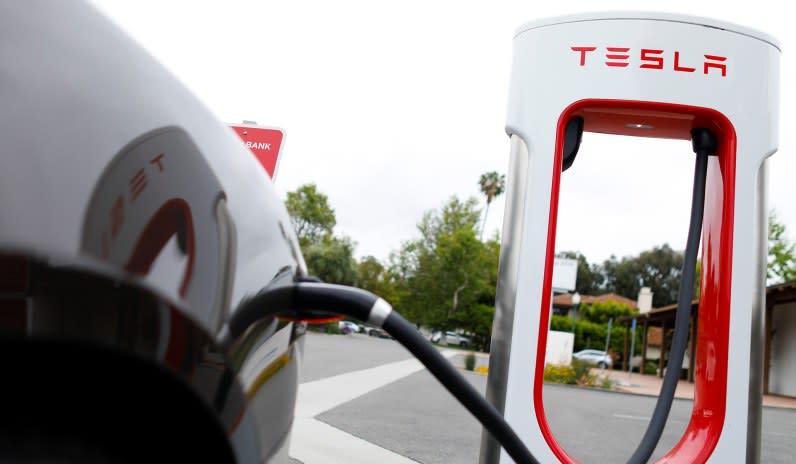Biden’s Electric-Vehicle Plan Misses the Mark

In pushing a transition away from fossil fuels, President-elect Joe Biden emphasizes the threat of a rising China, arguing that an American shift to electric vehicles ought to be homegrown rather than dependent on a rival across the Pacific. From Biden’s campaign website, one would believe that the market for electric vehicles is of as much geopolitical import as the Cold War space race. Biden’s energy plan claims that “China is on track to command more than four times the global market share compared to the U.S. in electric vehicle production” and that the outgoing U.S. president has “allowed China to race ahead.”
But if Beijing does have a stranglehold on electric-vehicle production, it is not tipping its hand. In September, China EV 100, a Chinese EV industry think tank, warned that China is at risk of foreign dependence in the EV supply chain.
For example, in the production of semiconductor-based components necessary for EVs, only one Chinese company ranks in the global top 20, according to China EV 100 vice president Zhang Yongwei, with less than 5 percent of automotive chips being made in the country. Semiconductor-based EV components represent 35 percent of vehicle-manufacturing costs, and by 2030 they could represent half of the manufacturing cost as other components become more affordable.
Increasingly, the EV supply chain involves other Asian countries; namely, Japan and Korea. Japanese and Korean companies are at the forefront of battery technology, quickly gaining ground on Chinese firms in the rapidly developing field. According to research by Anna Holzmann of the Mercator Institute for China Studies (MERICS), seven of the top ten battery manufacturers (based on lithium-ion battery shipments) were Chinese in 2017. Yet by 2019, Japanese and Korean firms, led by Panasonic and LG Chem, comprised half of the top ten. And in a culmination of this shift, MERICS reports, LG Chem unseated China’s Contemporary Amperex Technology Co. Limited (CATL) as the top global supplier in the first half of 2020. One explanation for LG Chem’s ascent in the rankings is Beijing’s 2019 policy shift to allow Japanese and Korean batteries back into China in order to meet the country’s gargantuan demand.
The production of batteries is, of course, resource intensive, dependent on cobalt and lithium. While China indeed has a commanding position in the production and processing of the two elements, cobalt can be swapped for alternatives such as nickel, and lithium itself is not particularly difficult to extract.
Though any Elon Musk announcement ought to be taken with a grain of salt, at Tesla’s September “Battery Day” event, he told investors that the company is developing a zero-cobalt battery line that will increase performance and reduce costs. He added that an explosion of lithium production is on the horizon, perhaps by Tesla itself using clay in the American southwest. Even if Musk’s claims fall short, new lithium-production techniques are emerging from nodes of innovation across the globe each year. Just as the production of shale oil marginalized OPEC, market pressure is likely to render moot China’s ore advantage, without any intervention from Washington.
Biden’s plan for an American EV industry overlooks these nuances. Rather than sound geopolitics, his gambit reflects political pandering to U.S. regions that feel diminished by globalization. The Biden campaign’s Made in America plan refers to China 24 times by name; it makes nary a mention of Japan or Korea. The plan flirts with voters’ base instincts and neglects the value that Americans reap through the embrace of global comparative advantages. If American firms are to elevate their EV profiles, it should be because they’ve made market-appropriate decisions — as Tesla has shown is possible.
Biden’s plan to “use all the levers of the federal government” to expedite EV reshoring is more than just unnecessary, it’s unwise. Backing for a domestic EV industry will be more likely to fund those with a knack for political angling than those with a knack for innovating. Consider past government supports for companies and projects promising to expedite an energy transition, including Fisker, Solyndra, Ivanpah, and Crescent Dunes.
The alternative to a Made in America EV industry is not to place the U.S. at the mercy of China, as Biden intimates, but to integrate the U.S. into positive-sum value propositions, such as the arrangement by which Panasonic has partnered with Tesla at the company’s Nevada Gigafactory. Biden acts as if Chinese Community Party apparatchiks would hold the United States’ proverbial keys without a Washington-sponsored, domestic-exclusive EV production process, but firms such as Panasonic and LG Chem are trustworthy partners in similarly open societies.
Both Biden’s assumptions about EV-component suppliers and his expectation that American companies will supplant them are out of keeping with reality. “Other countries should be buying the next generation of battery technology and electric vehicles manufactured by American workers,” Biden’s website states. But the firms from which America currently buys some of these products have a wealth of institutional knowledge that cannot be replicated stateside at the drop of a politician’s edict.
Rather than playing China’s mercantilist game on electric vehicles, Joe Biden should heed the deficiencies of state sponsorship and embrace the economic value that flows from reliable trans-Pacific trade.

 money
money 